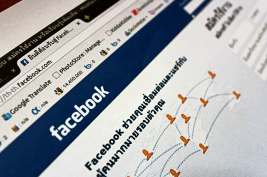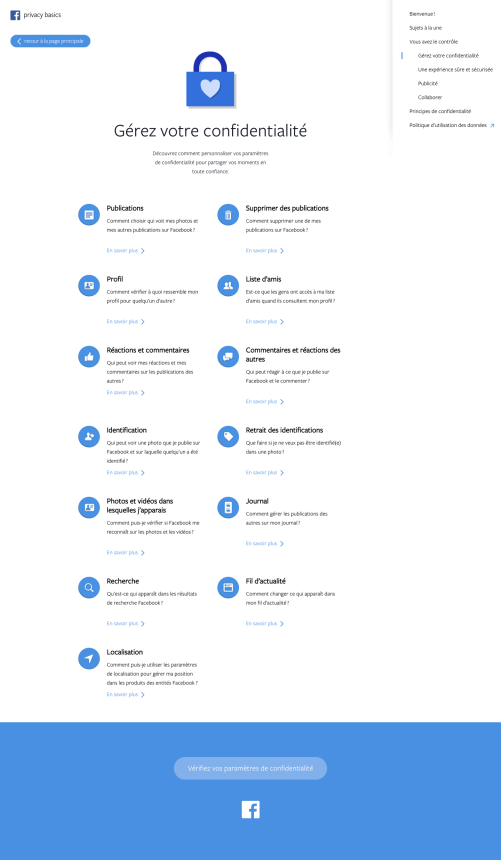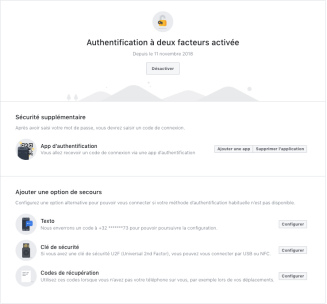Knowledge is power
In a world where technologies have evolved to take such a huge place in our daily life from our office and home computers to our pockets the amount of data that his collected on our habits is bigger every day.
It provides to a company anything it wants to know about people that are customers, prospects or anybody else and help the company to reach its objectives.
But data can also be used on other fields than the economic one. Indeed in 2018 several scandals were put under the spotlight, the biggest one involving especially Facebook and the firm Cambridge Analytica. Facebook would have sold data that were used by Campridge Analytica in order to influence elections. Another example of scandal, this time involving Facebook alone was a big breach into their system, hundreds of thousands of Facebook’s user personal account data were involved.
“Knowledge is power” and data represents this saying perfectly.
Therefore, we can say that the European GRDP arrives on time. Its application in may 2018 changed everything about the data use and collecting methods in Europe. Companies were asked to be more transparent about their use of personal data in front of customer and those which didn’t respect the time allowed for the transformation were charged with fines over their turnover.
Still it is important that us, the consumers are aware of the fact that our data are used and sold which is legal but we can have an influence on it. And as we all know we are all active on different social medias where a lot of our personal life is known on. So it might be useful to know some “tips and tricks” to manage our accounts in order to protect as much as we can our personal data.
How to protect our data on social medias?
First of all, a law was signed on May 25 that help us to fight against people who use illegally our personal data. All social networks know what we read, what we watch, what we buy, what interest we have for this or that. We have to know that minor benefits a better protection than adult. Since May 25, social networks and any site that has our information must ask for our agreement that is the GRDP (general regulation on data protection).

Some tips on how to properly protect your data:
ON FACEBOOK:

you should know that Facebook is the most attacked website for personal data.
To protect them well:
– Control what you publish on Facebook
– Manage the interactions and impact of others on you and your content
– Customize what you see
– Protect your account
– Control the ads that Facebook shows you
You can manage all these things here : https://www.facebook.com/about/basics/manage-your-privacy

ON INSTAGRAM :
You can find many tips on how to protect carefully your account here : https://www.facebook.com/help/instagram/477434105621119/
But you have to pay attention to :
– Check your visibility
– Resolve abuses and block people
– Share photos securely
– Report something (hacked accounts, identity theft, various abuses etc.)
ON TWITTER :
Twitter signals that what you are writing is likely to be read all over the world. so it’s very important to protect your data. Use a username and not your full name.
ON ANY WEBSITE :
Use the double authentication to connect you. Thanks to that you will not lose your account. It’s very simple to activate it, for example on Facebook it’s here :
https://www.facebook.com/security/2fac/setup/intro/

With these few points you have learned different ways to manage your personal data in order to limit their use by companies.
Let’s also remember that even if companies have to be more transparent about their use of our data and also have to protect them from external intrusions especially nowadays where data is a new gold, we are responsible for everything that we post on this kind of websites.
Questions :
- Have you ever had problems with your personal data ? if yes, explain ?
- Do you care about the use of your data?
- Do you think that the company use of your data can be useful to you? How?
sources :
Thanks for reading.
William Flipse & Gauthier Carbonnelle
Hi! Great article.
In regard to your first question, I’ve never experienced issues with my personal data. But I know someone who has been hacked. Besides he lost all his personal pieces of information on his computer..
Regarding the next question, I do care about to use of my data. Besides, I always do everything possible regarding the security of my different accounts.
Eventually, it doesn’t bother me to give away information about me. In one way, I receive relevant content when I browse on the web in exchange of my data.
SIMON Laurent
J’aimeJ’aime
Hello,
For the moment I have never had any problems with my personal data. I know that we are always tracked down on the internet by cookies and that we also have the possibility of being hacked, but for the moment I am happy to be able to say that I have never had a problem with that and I hope it will never happen to me.
Yes, I think everyone worries about that kind of thing and myself include, after all, it’s about our private lives, it’s sensitive data that we don’t necessarily want to share with everyone. The theft or hacking of such data could completely harm someone’s life.
Today, we live in a world full of publicity. Since we can’t block advertising everywhere on all social networks, devices or others, at least in this way, we can be targeted and have advertising related to what we love.
Taranu Marius
J’aimeJ’aime
Hello,
Good text, it’s quite interesting to talk about this subject.
So yes, I have already received emails following data leaks. So I was entitled to scammers who wanted money from me. So it’s quite boring.
So I care about the use of my data yes and no. I don’t often refuse cookies because as we see in our courses, these cookies are there to « help » companies to better understand us. So yes, it’s a little weird to say that, but we’ll also want to collect your data later.
So for us, no, I don’t think it’s useful because I’ve never (or not that I remember) received a particular service because of my buying habits. Except for retargeting.
Here I hope I helped you! D
J’aimeJ’aime
Hi guys, to start I would say that your article is really very useful for people with a social network account. Besides, who has not today? 😂 Speaking of security, fortunately I have never had a problem with data. I hope I will not have ahaha !! In addition I find that the fact that companies use our data would also be an advantage for us. We will have targeted advertising. It’s more interesting to see ads that interest us! Good job!
Sezer Ciftci & Sebastian Gay
J’aimeJ’aime
Hi,
Great article and I learned some new things thanks to you !
To anwser to your questions :
1) Yes a long time ago , when I was a kid ! I used to play a lot with my playstation 3, and to play online you need to create an account, to do so you have to give your personal information and if you want your bank information aswell. Well there’s one time when playstation was attacked by hackers and they stole a lot of personal data from users. I remember to compensate us Sony gave us 3 free games of our choice, and at that moment I found that great ! Well because my information of my profile was fake, and I did not give bank information but now I feel bad for the others users.
2) Of course I care about my personal data! If someone wants to use it I prefer to know in which goal and why and of course they have to ask me before !
3) It can be useful because when we are using internet and some ad appear it’s always better to see something which interests us than for example I prefer to see an ad about books than about hoverboard. And it’s the same when we received newsletter, it can be about something interesting and not something that annoys us
Henry AYALA
J’aimeJ’aime
Hello!
1. I’ve never had problems with my personal data, but I received many private messages on Facebook or Instagram and many emails that were attempts to steal accounts or personal information.
2. Everyone worries about personal data, we all have pictures, documents we do not want to share with someone else.
3. We can be targeting and later we can receive ads that with objects or services that we like.
Cosmin LIUTIC
J’aimeJ’aime
Hello guys!
It is a really good article, each point is well developed and the all the tips are very useful for people who will take care of their data.
We never had issues with our personal data but a lot of our friends do. Their accounts have been hacked. After that they had to report their accounts and to create a new one.
We don’t really care about our personal data because we know what we post on our social networks. We can uderstand that some people pay more attention to their data. The only place were we have sensitive data is our email and our social network but we manage it well.
The use of our personal data can be useful for us and for the company. Let us explain. We think that for us it is a good way to see only advertising that we like on the internet and for the company it is a way to save money on advertising campaign for example.
Camille Vermeire & Eliot Steuve
2eBB1
J’aimeJ’aime
Hello,
We found your article very interesting. Indeed, your article is relevant. We have heard a lot about our private lives this year.
We would like to tell you a little more about the GDPR. Indeed, Simon did his internship in a digital company and was at the heart of the transition.
The rules that have been put in place are huge compared to what was in place before. Each company must sign contracts with all its partners and suppliers to ensure that they comply with the GDPR. In addition, the company must be able to provide a list of the information it collects about users at any time. Even if she doesn’t save the data.
As a user, you can ask any company at any time for the information it has about you. You can also ask to delete everything without justification.
However, we remain aware that our privacy remains at risk with the Internet. Can we really face giants like Amazon or Google?
The google boss had to appear recently before the American congress. Bob Goodlatte, a Republican representative, said Google is « the largest data collector that history has ever known through billions of daily searches, enough to make the NSA blush »
Simon de Meeûs & Alexandre Charlier
J’aimeJ’aime
Hello,
Your article was really very interesting. I have learned a lot.
1) No and fortunately
2) Yes, very much so. When asked if I want to save my data, I click on the cross directly. I don’t like to leave my odnnées u can everywhere.
3) This may be useful but I’m not totally convinced by the idea. There are robots pretending to be Internet users and some of them have fun searching for anything and everything or someone close to them can use our phone and leave their data.
Mokhtari Ines & Brandon
J’aimeJ’aime